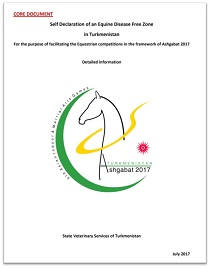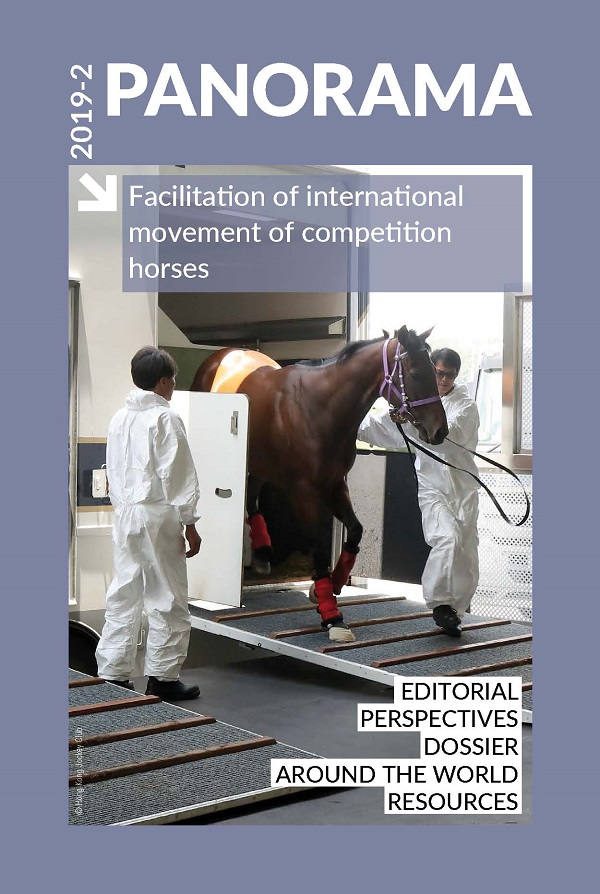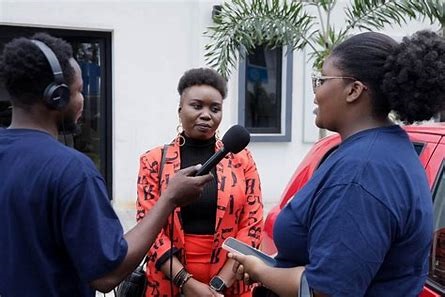Around the world Posted on 2019-09-24 10:45:03
Success stories
Temporary equine-disease-free zone (EDFZ) in Turkmenistan in 2017
for the 5th Asian Indoor and Martial Arts Games
Keywords
Authors
Susanne Münstermann(1)*, Anthony Kettle(2) & Dovlet Nuryyev(3)
(1) Animal Health Consultant, Bonn, Germany.
(2) Equine International Consulting, Darwin, Australia.
(3) Border Control Service, Turkmenistan.
* Corresponding author: susanne.munstermann@adt.de
The designations and denominations employed and the presentation of the material in this article do not imply the expression of any opinion whatsoever on the part of the OIE concerning the legal status of any country, territory, city or area or of its authorities, or concerning the delimitation of its frontiers and boundaries.
The views expressed in this article are solely the responsibility of the author(s). The mention of specific companies or products of manufacturers, whether or not these have been patented, does not imply that these have been endorsed or recommended by the OIE in preference to others of a similar nature that are not mentioned.
Hosting an international equestrian event in a country with an undetermined health status for some equine diseases is undoubtedly a challenge. However, this challenge can be overcome by creating an EDFZ, an approach which was applied in Turkmenistan. A temporary EDFZ was self-declared for equine infectious anaemia, equine influenza and glanders in accordance with the relevant requirements of the Terrestrial Animal Health Code.
Before establishing the zone, 16 months of surveillance took place over an area of 4,000 km² for African horse sickness, equine influenza, equine infectious anaemia, glanders, surra and piroplasmosis.
The core zone of the EDFZ, Ashgabat Racecourse, did not house any horses for six months before the event and was thoroughly cleaned and disinfected. There were strict movement controls in the EDFZ during this period. The diseases identified in the surveillance zone of the EDFZ were piroplasmosis in horses and donkeys, and surra in camels.
Separation of the equine subpopulation inside the EDFZ from the general equine population outside was achieved through sound biosecurity management, horse identification, controlling horse movements and certification procedures. The separation ensured that horses within the EDFZ were protected from diseases that might have been occurring in other parts of the country and vice versa. Vector control was carried out by disinfecting and disinsecting the stables before horses could enter. Electric traps and pour-on repellents on the horses were also used to mitigate the risk of introducing vector-borne diseases, which had been identified in the surveillance zone, into the core zone during the games.
Participating non-European horses underwent a three-week observation period in the international quarantine centre just outside the surveillance zone. Horses from Europe were transferred directly from the airport via a biosecure corridor to the event venue. Horses were grouped and accommodated in different stable blocks, according to their country/region of origin, and a strict biosecurity protocol was applied.
Eight nations and 42 horses participated in the games and not a single case of disease was reported. All horses returned home in full health.

https://doi.org/10.20506/bull.2019.2.2982












